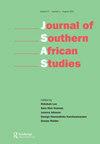新兴的小农棉花灌溉农业和紧张的土地劳动力需求在桑亚提,津巴布韦,1967-1990
IF 0.7
4区 社会学
Q2 AREA STUDIES
引用次数: 0
摘要
本文探讨了1967年至1990年,试点的小农户Gowe灌溉计划、毗邻的旱地农业社区和TILCOR/ARDA在津巴布韦Sanyati的核心灌溉区之间的农业劳动关系。这是对新兴的小农棉花灌溉农业以及这一过程与房地产部门劳动力需求之间的矛盾的分析。文章认为,一旦主要灌溉区成立,Gowe地块持有人(直到1974年一直作为一个准自治单位存在(监督他们自己的劳动力需求))就成为了该区的主要体力劳动储存库。文章的核心是国有棉花庄园、受益于土地和灌溉安排的一群相关地块所有者(后来的种植者)和整个农业社区之间有趣的三方紧张关系。本文章由计算机程序翻译,如有差异,请以英文原文为准。
Emerging Smallholder Cotton Irrigation Agriculture and Tensions with Estate Labour Requirements in Sanyati, Zimbabwe, 1967–1990
This article explores agrarian labour relationships between the pilot Smallholder Gowe Irrigation Scheme, the contiguous dryland farming community and TILCOR/ARDA’s core irrigation estate in Sanyati, Zimbabwe, from 1967 to 1990. It is an analysis of the emerging smallholder cotton irrigation agriculture and the contradictions between this process and the labour requirements of the estate sector. The article argues that, once the main irrigation estate was established, the Gowe plot-holders, who until 1974 had existed as a quasi-autonomous unit (overseeing their own labour needs), then served as the estate’s major manual labour repository. At the core of the article is the interesting tripartite tension between a state-run cotton estate, a group of associated plot-holders (later outgrowers) benefiting from land and irrigation arrangements and a farming community at large.
求助全文
通过发布文献求助,成功后即可免费获取论文全文。
去求助
来源期刊

Journal of Southern African Studies
AREA STUDIES-
CiteScore
1.40
自引率
0.00%
发文量
73
期刊介绍:
The Journal of Southern African Studies is an international publication for work of high academic quality on issues of interest and concern in the region of Southern Africa. It aims at generating fresh scholarly enquiry and rigorous exposition in the many different disciplines of the social sciences and humanities, and periodically organises and supports conferences to this end, sometimes in the region. It seeks to encourage inter-disciplinary analysis, strong comparative perspectives and research that reflects new theoretical or methodological approaches. An active advisory board and an editor based in the region demonstrate our close ties with scholars there and our commitment to promoting research in the region.
 求助内容:
求助内容: 应助结果提醒方式:
应助结果提醒方式:


